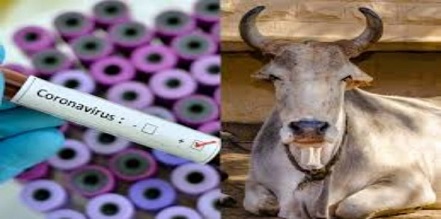BREAKING! German Scientist Warn Of Potential Recombinant SARS-Cov-2 And Bovine Coronavirus Emerging After Finding Cattle Contracting SARS-Cov-2!
Source: Medical News - Recombinant SARS-CoV-2 And Bovine Coronavirus Emerging Aug 03, 2022 3 years, 4 months, 3 weeks, 1 day, 15 hours, 24 minutes ago
German researchers are warning of a potential chimera involving SARS-CoV-2 and bovine coronavirus (BCoV) could emerge and pose a threat to both humans and also cattle after discovering SARS-CoV-2 infections in cattle.

The study team also expressed that ruminants should be considered in outbreak studies and warranted routine testings to prevent the spread of novel SARS-CoV-2 variants across the livestock population.
As early as August 2020, Thailand
Medical News already covered a study that showed that cows could be infected with the SARS-CoV-2 and warned readers not to consume raw milk.
https://www.thailandmedical.news/news/covid-19-news-indians-warned-to-avoid-consuming-raw-milk-unless-pasteurized-as-german-study-shows-cows-can-get-infected-with-sars-cov-2
In the past, numerous researchers warned that human infection with SARS-CoV-2 poses a risk for transmission to animals.
In order to characterize the risk for cattle, the study team serologically investigated 1,000 samples collected from cattle in Germany in late 2021.
The study found eleven antibody-positive samples indicating that cattle may be occasionally infected by contact with SARS-CoV-2–positive keepers, but the study team found no indication of further spread.
The study findings were published in the peer reviewed Journal by the U.S. CDC called Emerging Infectious Diseases.
https://wwwnc.cdc.gov/eid/article/28/9/22-0125_article
The SARS-CoV-2, the causative agent of COVID-19 in humans, was initially discovered in late 2019, it has spread incredibly quickly globally. This massive worldwide pandemic has claimed more than 6.43 million human lives in roughly 28 months of virus circulation and numerous surges involving newer variants. To date although official figures show that globally about 584 million people have been infected with the SARS-CoV-2 already, the actual figures could be as high as 3.5 billion people!
Importantly, SARS-CoV-2 infection in humans increases the possibility of animal transmission. With a particular focus on discovering vulnerable species and prospective reservoirs or intermediate hosts, various researchers evaluated the involvement of wildlife and livestock species at the human-animal interface since the COVID-19 pandemic's inception.
Numerous past studies reported that several animal species, including nonhuman primates, canids, felids, mustelids, white-tailed deer, and numerous Cricetidae rodent species, were susceptible to SARS-CoV-2 infection in experimental conditions, whereas swine or poultry were not.
Following experimental SARS-CoV-2 inoculation, domestic ruminants like sheep, cattle, or goats had poor susceptibility; very few animals could contract the infection without animal-to-animal spread.
Also, in only one to two days, cattle tested SARS-CoV-2-positive by reverse transcription polymerase chain reaction (rt-PCR) following experimental infection. Thus, serologic scr
eening may be more valuable for detecting priorly infected animals and determining the spillover infection rates in the field.
The study team serologically examined 1,000 samples of cattle gathered in Germany at the end of 2021 to determine the COVID-19 risk to cattle.
The study team evaluated 1,000 plasma or serum samples obtained from cattle at 83 farms in four German federal states (Lower Saxony, Bavaria, Thuringia, and Saxony-Anhalt). They noted that no permissions were required to obtain these specimens because they were surplus material from standard diagnostic submissions made by the accountable veterinarians in the framework of the health surveillance of the specific cattle farm.
Specimen sampling took place in the 2021 autumn and the early winter of 2021 to 2022, when a massive surge of SARS-CoV-2 infections attributed to the Delta variant of concern (VOC) occurred among humans.
The study team investigated two to 20 randomly chosen plasma or serum samples per farm. They sampled farm 31 twice, and the owner of the animals was quarantined in the interim.
A unique multispecies enzyme-linked immunosorbent assay (ELISA) based on the SARS-CoV-2 receptor-binding domain (RBD) was used to evaluate all samples from cattle.
The study team also analyzed an extra 100 randomly procured cattle control samples from 2016 in Germany.
The research findings showed that 11 cattle from nine farms were positive for the SARS-CoV-2 RBD ELISA among the 2021 cattle samples.
It was also discovered that one of these animals, from farm 31, was sampled after the quarantine of the owner.
An indirect immunofluorescence test using Vero cells infected with the SARS-CoV-2 2019 nCoV Muc-IMB-1 strain as the antigen matrix confirmed positive results of ELISA for all but one sample from farm 8. Besides, titers varied from 1:8 to 1:512, with farm 31's seropositive animal having the highest titer.
The detailed assessment of RBD-ELISA-positive 11 samples utilizing a surrogate virus neutralization test (sVNT) enabled the identification of SARS-CoV-2 neutralizing antibodies. The analysis was accomplished by simulating the interplay between the receptor protein of the host cell membrane, i.e., angiotensin-converting enzyme 2 (ACE2) and SARS-CoV-2. Moreover, four cattle from farms 74, 47, 31, and 11 had positive sVNT results.
The study findings showed that 11 cattle samples from Germany were positive for SARS-CoV-2 antibodies, implying that cattle may occasionally become virus-infected and seroconvert through exposure to COVID-19-infected keepers.
The study team however found no additional evidence of intraspecies viral spread in the field, in line with the former experimental infection assessments.
The study team however stressed that future monitoring initiatives should include cattle farms, particularly given that another CoV (i.e., BCoV) was quite common across cattle, and a BCoV infection did not shield against contracting SARS-CoV-2 according to a prior study.
Also, animal hosts' vulnerability to the Omicron VOC was unknown, especially the newer BA.2, BA.3, BA.4 and BA.5 variants and their emerging sub-variants.
Th study team also warned that recombination events between the two viruses could result from double infections in a single animal, a process seen with other CoVs already.
In conclusion, the study team said that the limited susceptibility of cattle to SARS-CoV-2 makes emergence extremely unlikely, but a potential chimera among SARS-CoV-2 and BCoV could pose an extra concern. The study stated that ruminants should be considered in outbreak studies and warranted routine testings to prevent the spread of novel SARS-CoV-2 variants across the livestock population.
For the latest
SARS-CoV-2 research, keep on logging to Thailand
Medical News.
